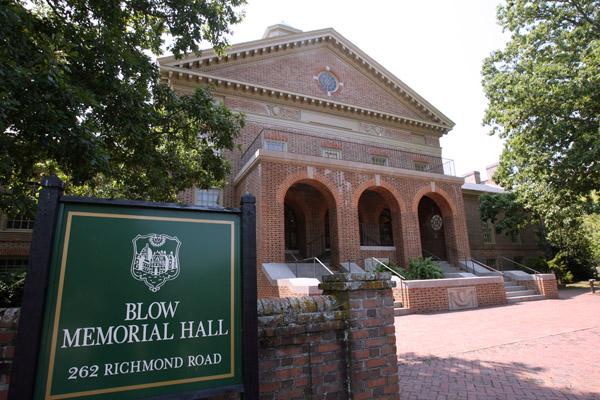Friday, March 24, on-campus organization No Lost Generation sponsored a lecture about the Syrian refugee crisis open to students, faculty and members of the Williamsburg community.
The lecture was conducted via Skype and covered information about the war in Syria and the toll it is taking on Syrian children.
Save the Children’s Associate Director of Policy Focus Kari Fuglesten Reid began her lecture by asking the students in attendance to imagine an emergency at the College of William and Mary. In her scenario, everyone was told to evacuate immediately, with no time to gather their things or prepare in any way. Different students were evacuated to different places, and people were scattered across different areas. Fuglesten Reid asked the students to imagine how afraid they’d feel and then to imagine how magnified that fear would be if they were children and an even more extreme scenario involving war and bombing happened.
This is just not a normal environment for a child … Think about what children are feeling under those circumstances,” Fuglesten Reid said.
“This is just not a normal environment for a child … Think about what children are feeling under those circumstances,” Fuglesten Reid said. “This is exactly why Save the Children and our partners are working on this issue. We’re trying to find ways to help children cope with what they’re living with on a daily basis.”
Fuglesten Reid said that the biggest source of stress that Syrian children face is the constant and unpredictable bombing and shelling, and the threat is not only physical but psychological.
“After six years of war, Syria is facing a serious mental health crisis that risks leaving millions of children with potentially irreversible psychological scars by their extreme exposure to the trauma of war,” Fuglesten Reid said.
According to Fuglesten Reid, children who experience this kind of trauma are facing toxic stress. They exhibit signs of post-traumatic stress disorder, and this stress is an ever-present reality for them.
“Some children are so desperate that they say they want to die so they can go to heaven to be warm and eat and play. The situation has become so dire in some places that we’ve actually seen an increase in teenage suicide attempts,” Fuglesten Reid said.
Fuglesten Reid talked about a young boy that Save the Children had worked with whose family had escaped from an area controlled by ISIS. This child had witnessed a public beheading, and the experience had affected him profoundly. He couldn’t sleep well, had nightmares of someone trying to kill him and exhibited signs of trauma. His parents didn’t know how to react or how to help him. Save the Children works to prevent children like this young boy from internalizing this trauma and violence and becoming numb to it.
“The longer children are under this type of stress, they can actually become immune to violence and think it’s normal and not a big deal, and they can internalize and act out what they’re seeing,” Fuglesten Reid said.
Fuglesten Reid said that a second major cause of stress in Syria right now is the lack of educational opportunities. Many children cannot receive an education because their schools are being bombed, which she noted is a violation of international humanitarian law.
At Save the Children, we do have a specific focus on trying to find ways to get kids back in school,” Fuglesten Reid said.
“At Save the Children, we do have a specific focus on trying to find ways to get kids back in school,” Fuglesten Reid said. “If they are too afraid to enter school buildings, we do things like increase home-based education … We also run schools underground, literally in tunnels and basements, because it’s safer from the bombing. And we also follow children who are displaced from one camp to another to make sure that they continue to get an education the best that they can.”
Cameron Shifflett ’20 attended the lecture because of his concern about this issue.
“I hope to learn there is something we can still do because on the whole I feel like we’ve failed completely in that area, and it’s rather embarrassing and disgusting,” Shifflett said.
Shifflett explained that this issue is important to him because innocent lives are being taken.
“People are dying,” Shifflett said. “It’s not a matter of ‘oh, it doesn’t impact us because we’re over here.’ It’s everyone. There are innocent people who are dying.”
Executive Director of No Lost Generation Mili Nadipalli ’18 explained why the issue hits home for her.
“I’m an immigrant,” Nadipalli said. “I was born in India, and we were actually really lucky with our immigration status because people from my family have applied and been rejected.”
Nadipalli said that the United States’ inactive role in helping Syrian refugees is infuriating to her.
“It’s hard not to sit here and boil about it and be mad … I was hearing a lot of stories about other countries that are being more accepting,” Nadipalli said.
Nadipalli said she wants her fellow students at the College as well as the general public to continue caring about this issue, even when it is not in the news.
“I encourage people to stay up to date with refugee issues,” Nadipalli said. “The biggest thing is that it falls in and out of fashion … I think people think that if they’re not hearing about it in the news constantly things are improving, but they’re really not so I just encourage people to stay up to date and actively look for themselves rather than waiting for news to come to them.”

